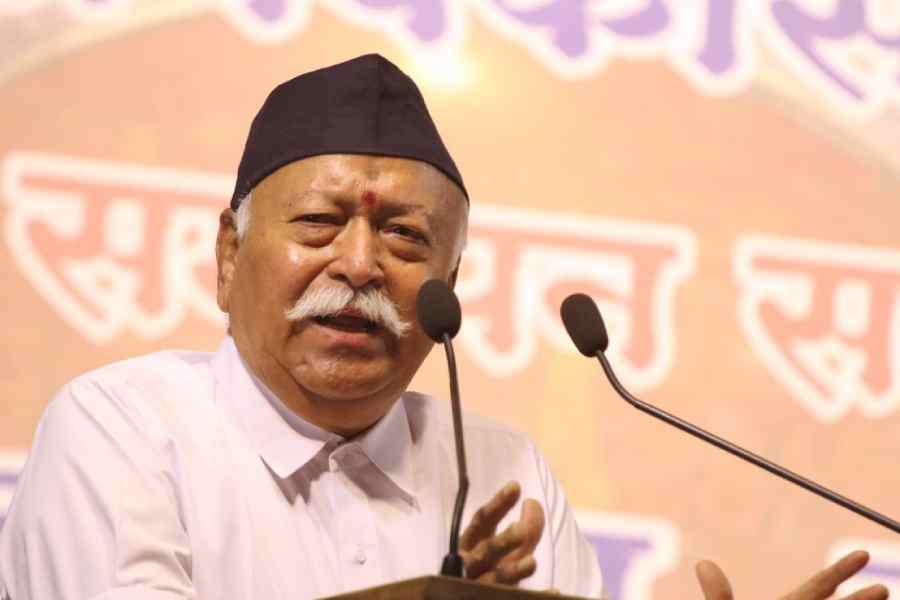NAGPUR MESSAGE: Narendra Modi has managed to coast to a third straight term as Prime Minister but the reduction of his Lok Sabha numbers to a minority has opened him to renewed scrutiny from the Sangh.
RSS chief Mohan Bhagwat’s strong words disapproving “ahankar” (arrogance) of the “sevak” (Modi calls himself pradhan sevak and not PM) and condemning the “bitter” election campaign endangering social harmony are being seen as an indictment of the Modi regime’s house style. A new churn has also set in with leaders in states accusing “internal sabotage” as a prime reason for the setback the BJP faced in strongholds like Uttar Pradesh.
The Modi-Shah duopoly had succeeded in virtually muzzling all such voices over the last decade but the veneer of a controlled regime appears to be coming off with the fabled “Modi magic” failing to secure another thumping majority, as was the poll cry.
“A true ‘sevak’ should maintain dignity while working… The one who maintains dignity does his work, but remains unattached. There is no arrogance that I did this. Only such a person has the right to be called a ‘sevak’,” Bhagwat said addressing an event on Monday in Nagpur, the headquarters of the RSS.
Such strong words had rarely been voiced by the head of the BJP’s motherboard in the last decade. The timing of Bhagwat’s remarks — the day the third Modi government took office — left none in the saffron family in doubt about who they were meant for. It has come after another key RSS leader Ram Madhav in an opinion article in a newspaper termed the 2024 poll results as a “mandate for humility”.
Bhagwat went further making it amply clear that he was aggrieved by the blatantly divisive “mangalsutra” to “mujra” dominated poll campaign led by PM Modi, although he ticked off the Opposition as well.
“The kind of things that were said, the way the two sides castigated each other (during the elections)… the way no one cared about social divisions being created… because of what was being done… and for no reason the Sangh was dragged into this… untruths were spread with the use of technology. Is this the way knowledge should be used? How will the country operate like this?” Bhagwat wondered. “The elections should be viewed as a competition and not a war”.
The Opposition is not ‘virodhi paksh’ (opponent) it is ‘pratipaksh’ (counterpart)”. The RSS chief went on to stress the need for “consensus” building, underlining that “Parliament has two sides so that both sides can be heard”.
A bitter indictment if one recalls how key legislations had been steamrolled through Parliament by the Modi government and Opposition members summarily suspended in record numbers for pressing that their voices be heard.
Bhagwat even flagged the government’s inaction on Manipur. “Manipur is still burning. Who is going to pay attention to it? It is the duty (of the government) to deal with it on priority,” Bhagwat said.
The import of Bhagwat’s outpouring was seen in BJP circles as a message that Modi could no longer take Nagpur for granted. In his last two terms, Modi fulfilled most of the key ideological demands of the RSS like construction of the Ram temple and abrogation of Article 370 but entertained no meddling by the parent outfit in running the affairs of the party and the government.
The RSS was also not consulted in picking candidates for the Lok Sabha polls and in many cases the reservations expressed by the parent body over candidates were ignored by the BJP leadership.
“The RSS will now assert and that is the message from Sar Sanghchalak (RSS chief),” one BJP leader said, indicating that the return of the current BJP president. J P Nadda to the government was a signal that his comments during the polls that the “BJP was no longer dependent on the RSS” had hurt the ideological parent.
“Not only Nadda’s remarks over the RSS but Modi’s claim that he was not biological. but a godsend also angered us,” one RSS leader said, stressing that the remarks combined with the shrill “Modi ki guarantee” and the over-confident “chaar sau paar” cry reeked of arrogance. “Modi ji has been an RSS pracharak and he should know that humility is the quintessential trait of a swayamsevak,” the RSS leader said.
Amid speculation over who could be the next BJP president, party insiders acknowledged that the RSS would play a key role in the selection. “The new BJP chief has to be vetted by the RSS,” one BJP leader said.
Already, more than one round of consultations has been held between BJP and RSS leaders with sources indicating that the topic of the meetings has been over government formation and also picking a leader to head the BJP.
In addition to the heat from the Sangh, a churn in states from party-ruled Uttar Pradesh, Maharashtra, Rajasthan and Haryana has started to spill out into the open with party leaders publicly accusing “internal sabotage” as a major reason for the poor polls performance.
In UP, more than one key leader, including ministers who lost the polls, have accused sections of the party, including MLAs, of working to defeat them.










